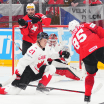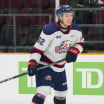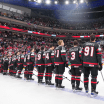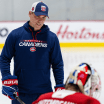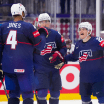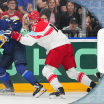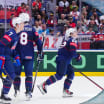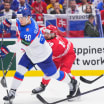MONTREAL - Executive Vice President, Chief Commercial Officer, and NHL Alternate Governor France Margaret Bélanger recently joined Marc Dumont for a special episode of the "L'histoire s'écrit" podcast.
The pair chatted about how the team has adapted during the pandemic, how the organization is preparing to welcome fans back to the Bell Centre, what goes on at NHL board meetings (apparently less cigar smoking and cognac swilling than one might hope...), and how Groupe CH - which includes the Canadiens, Laval Rocket, evenko, and Spectra - has succeeded in bringing more female voices to the table. She also shares some solid advice for anyone looking to break into the sports and entertainment industry.
Read on for a few highlights from her discussion with Dumont, which is available in its entirety wherever you get your podcasts.
This special International Women's Day episode of
Podcast highlights: France Margaret Bélanger
The Canadiens' EVP and CCO was recently a guest of Marc Dumont on a special episode of the "L'histoire s'écrit" podcast
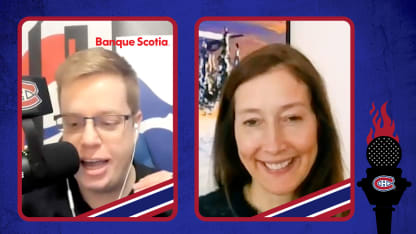
SHOP: Matte Black Water Bottle
MARC DUMONT: Can you share your story with us? What's the story behind France Margaret Bélanger?
FRANCE MARGARET BÉLANGER: I was born in Matane. My parents still live there. That's where I grew up. I went to elementary school and high school there. Then, I went to CEGEP Champlain St. Lawrence in Quebec City because I wanted to work on my English. Then, I went to law school at the University of Ottawa. I was recruited by the firm Stikeman Elliott. That's where I did my internship. After my internship, I worked there for 17 years, specializing in business law. I was a partner in business law for 10 years. One thing led to another and my relationship with George Gillett began around 2001. We got a call from a Chicago law firm, Winston Strawn, and they were representing George Gillett. He was looknig to buy the Montreal Canadiens and the Molson Centre and we got the call to do the work. Back then, I was just a young lawyer. I'd say it was a stroke of luck. An associate called to ask me if I was available to lead the transaction and that's how I started working on the file. The sale was completed on July 26, 2001. That's when George Gillett took possession of the titles. The Canadiens didn't have internal counsel at the time or a legal team. Groupe CH didn't exist. There was a small entertainment company called Groupe Spectacles Gillett. But, there really wasn't any internal legal counsel. Given that I had done all of the transaction-related work and I knew the company from top to bottom, I was the person who was asked to address issues at the corporate level. I worked directly with that team. In 2009, George Gillett sold the team. We were the ones who acted on his behalf, of course. The sale in 2009 was conducted via auction, and Geoff Molson's group won. That's how I met Geoff, who called me in 2013 and saked me to joini the team. That's my story before joining the Canadiens.
MD: What's it like working with Geoff Molson?
FMB: First, you have to understand that Geoff is the president and CEO of everything that encompasses Groupe CH, whether it's the Canadiens, the Rocket, evenko, or Spectra. But, Geoff is the owner as well. That's the distinctive element in the mix. As the owner, he's in it for the long haul. It's his strategic vision for the long term. He's a real visionary. He doesn't just think one year at a time. That's how he sees things. Geoff is well-surrounded. I'm not just talking about me, but the entire management team. There are a lot of us. Geoff has confidence in people, but he expects results. He works very closely with Marc Bergevin] in hockey operations. He has invested heavily in the entertainment sector since becoming the owner, but he's passionate about hockey above all else. He wants to win. He attends the majority of the games. It's definitely more difficult with COVID and the bubble concept. But if that weren't the case, he'd be going on the road with the team. He wants his team to win and that's really the primary objective. That's his passion.
**MD:** You're in charge of marketing. We talk about how we've had to change our attitudes a bit this year and maybe that will continue into the future. Obviously, things change quickly. Right now, we've seen changes like having logos everywhere in the rink. What other changes do you foresee? Obviously you need to make money, so you need to find new sources of revenues. Without knowing everything that could happen, talk to me about the plan there.
**FMB:** We've got many plans. There's Plan A, B, C, etc. There's a lot of uncertainty. It's an abnormal year and we hope we don't have another one like this. Obviously this year is different. On the hockey side of the business, the biggest sources of revenues are tickets and everything to do with hospitality. Suites, concessions during games.
Then there's our consumer products, which includes merchandise like jerseys and hats and that sort of thing. We've moved that entire business online for now on tricoloresports.com, which is growing in terms of its notoriety. Before, people maybe weren't as familiar with Tricolore Sports, they'd think more "the Canadiens' team store," but now tricoloresports.com is well-known and it's doing very well.
Then there are television rights. All of our games are broadcast on TV so that's another source of revenue. And then, finally, there are sponsorships. There are other sources of revenues as well but those are the big ones. This year, with the pandemic, we expected that many of those sources of revenue would totally disappear.
We've worked in close collaboration with the NHL, and they've been incredible. The NHL's Chief Business Officer is Keith Wachtel, who has been a huge help to teams in terms of finding new revenues. You can see a lot of them when you watch the games. For example, the lower two-thirds of our lower bowl is covered with cloth tarps, which is a new position for our sponsors. We had quite a few partners who opted for that, so we were able to monetize that. We did well with that this year. You probably noticed at the start of the season that the area behind the players' bench was elevated. The advertising that's there usually stops at the glass, but this year it was moved up higher behind the coaches. But a few weeks into the season, we received a League-wide memo that we needed to lower those because of COVID, because they didn't think the elevated walls were good for air circulation on the bench.
So we had to remove them and adjust again, and find new spots for those partners. We've had to make a lot of adjustments this year. And it's really been a lot of firsts. It's the first time we've had advertisements on the players themselves, with the logos you see on the side of the players' helmets. Bell is on there this year and the Bell logo looks great. So that's another new revenue source for us this year.
All of that still doesn't totally make up for what we lost, but at the same time, the League has found new properties that we can monetize in our markets. So that's it... you just have to adapt. We'll see what happens next. I'm optimistic, with everything going on with vaccines, I know there's a lot that can happen, there are variants and obviously COVID is still around. But with all the vaccines and the hard work the government is putting in to get people vaccinated, we're optimistic that next year, we'll be able to go back to a normal season. We're hopeful.
**MD:**Do you attend a lot of the Board of Governors meetings? What are they like? Is it just a bunch of people talking about hockey?
**FMB:** So, for starters, each team has a governor. Normally, the governor is the owner. So the governor for the Montreal Canadiens is Geoff [Molson], obviously. However, teams also have alternate governors, so one team can have many governors. And since I arrived in 2013, I've had the chance to attend all these meetings. Typically, there are three or four formal meetings on pre-selected dates each year.
A Board of Governors meeting is like a board of directors meeting. Gary Bettman, the NHL commissioner, presides over the meeting. Normally, he comes with his entire management team. Guys like Bill Daly, obviously, but there are many others who are there, too. The meeting is mostly a presentation on the current state and affairs of the League at that moment in time. So we talk about finances, sometimes the League will share survey results, or we hear about new initiatives. For example, Heidi Browning recently presented a new social media initiative involving the players. Kim Davis will talk about what's going on with diversity and community issues. The meeting is very diverse in subject matter.
At the legal level, Julie Grand and David Zimmerman will provide briefings on any on-going legal cases in the NHL. Colin Campbell will do a presentation on changes to in-game rules. Then, a vote might take place. Questions about expansion teams joining the League are also asked at these meetings. So, these meetings are like a board of directors meeting where we learn more about what's going in the League, and talk about the direction we're heading. It's a chance for us to talk and have in-depth conversations.
[Watch: Youtube Video
MD: So, you guys really get down to business. I always imagined you guys in these meetings sipping on cognac and smoking cigars. It's not at all like that?
FMB:(laughs) No, there's no cognac, no cigars.
MD: I've read that the majority of Groupe CH's executives are women. First of all, we know it's so important and it should be the case all over the world... but it's not. Can you explain the process you use to find this talent and how other organizations can use this method to hire more qualified women?
FMB:The expression that comes to mind is "tone at the top" and that starts with Geoff. He's our leader. And he's the one who made this decision. I think that I was the first woman to join the management group when I joined the team in 2013. When I arrived, there were a lot more men, and that's OK. I want to work with competent people, regardless of whether they are men or women.
So I joined that group. But it was Geoff who was determined at the time to bring in someone like me to join his team. He trusted me and I've tried not to disappoint him over time. After that, our Chief Financial Officer who had been with the team for about 35 years, Fred Steer, an amazing guy, decided to retire in 2017, so we were looking to hire a new person to replace him as Chief Financial Officer. That's when Anna Martini joined us. And I remember the head hunters were only proposing men to us for interviews at the time. Geoff and I both said we'd like to see more female candidates and that's when Anna's profile was brought to us, and we ended up hiring her. And Anna is an extraordinary woman. She is brilliant and competent. Over time, I wanted to bring someone in to join our legal team, so we got Patricia Brissette. Then, we needed someone to lead HR and we hired Sandra Petosa]. They happen to be women, but we also hired several men as well. Vincent Lucier, who many people know, leads the sales team. He's a great guy who does an extremely good job. Jon Trzcienski leads the marketing department, and he's been with the team for many years and is simply excellent. There are several men in our leadership group and it's great.
To answer your question, it takes someone to open the door for others, someone in a leadership position. And in this case, it's Geoff, our team owner and leader, who decided that's what he wanted to do and wanted to hire competent people, period.
We wanted people who could help the team, and he trusted our choices. And now, more than 50% of our VPs are women.
***[Click here to find the show on your favorite podcast app.*


